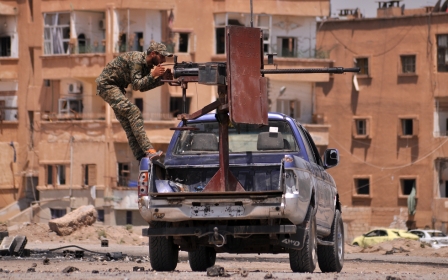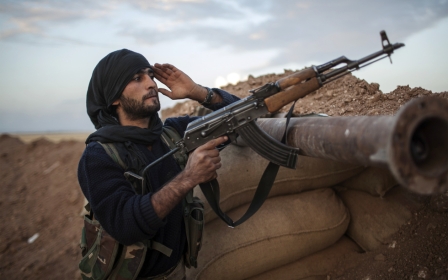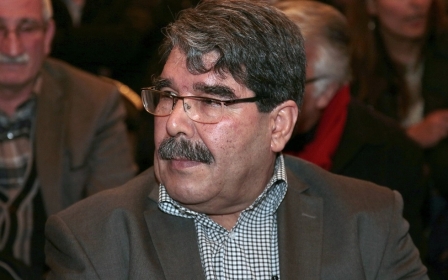Syrian Arab-Kurd forces prepare for offensive on Islamic State capital
AYN AL-ISSA, Syria – On the frontlines close to Raqqah, the capital of the Islamic state, quiet prevails. But in the near future, a coalition of Arab and Kurdish forces supported by the US will march from Ayn al-Issa to Raqqa to destroy the Islamic State (IS).
The Arab town of Ayn al-Issa was destroyed in fighting between Kurdish forces and the Islamic state in mid-June, and is a military zone where civilians are not allowed to return.
The town is situated about 50km north of Raqqah, and will be the future base for operations against the Islamic state.
Every week, suicide bombers try to attack the frontlines of Kurdish and Arab fighters near Ayn al-Issa. On 6 July, the Kurdish fighters were forced to expel IS fighters from the city.
On Monday evening, clashes erupted between Kurdish and IS militants in the village of Bayr al-Issa, east of Ayn al-Issa, after a YPG fighter foiled a suicide attack by an IS-fighter by killing him, forcing another IS fighter to flee.
The US-led anti-IS coalition dropped 50 tons of weapons to the newly created Syrian Arab Coalition on Monday in the Hasakah province, in order not to anger Turkey.
These weapons will be shared with their Kurdish allies of the YPG in order to take the fight to the Islamic state.
But so far, no US weapons can be seen on the frontlines close to Raqqa, nor any sign of rebel troop preparations.
“We haven’t received weapons yet. The last time the US supported us with weapons was one year ago in Kobani, but they have promised them,” said YPG fighter Heval Serfiraz, in the YPG headquarters base close to the town of Ayn al Issa.
“We don’t have heavy weapons like the Islamic state. We just have Kalashnikovs and Doskhas. IS weapons are much better than the YPG,” he said.
“We need anti-tank weapons and heavy weapons,” the YPG fighter, who originally comes from Turkey, said.
The US decided to support FSA and Kurdish rebels in the provinces of Raqqa, and Hasakah, after FSA rebels in the province of Aleppo gave their weapons to al-Qaeda’s Nusra front.
“As you know the opposition that was trained by the US joined Nusra, and for this reason the US lost its trust in the opposition. For this reason, the US’s only hope is the YPG,” said Ocalan Issa, the deputy defence official for the local Kurdish administration in Kobani.
The move might anger Turkey who considers the YPG rebels to be too close to the Kurdistan Workers Party (PKK), which Turkey considers a terrorist organisation.
Turkey warned both Russia and the US on Wednesday, saying it's "unacceptable" to arm the Kurds.
Until now, the frontlines with the Islamic state’s capital are manned by small groups of Free Syrian Army (FSA) rebels of the Raqqa Revolutionaries’ Brigade, and the Kurdish People’s Protection Units (YPG).
The Raqqa Revolutionaries’ Brigade includes both Arabs and Arab-speaking Kurds from the cities of Deir ar-Zour and Raqqa. They were one of the first groups to fight the Islamic State in Raqqa, but were expelled in January last year by IS.
Arabs 'must lead Raqqa fight'
So far, Kurdish rebels outnumber the Arab rebels, but the YPG says the prime responsibility for freeing Raqqa from IS lies with the Arabs since they do not want to be seen as occupiers of Raqqa.
“We are waiting for the Free Syrian Army (FSA) to start the offensive, since Raqqa is not inside Rojava [Kurdish territory], and we will be with them,” said YPG fighter Serfiraz.
“The airstrikes will hit the Islamic state through coordination Euphrates Volcano joint operations room,” Serfiraz told Middle East Eye.
Before entering Ayn al-Issa, checkpoints were manned by Arab fighters with the YPG.
“We are ready to fight for our honour, and we are ready for Raqqa, even if we are in the hundreds, we can fight thousands,” said Khalid Sinjari, a Arab fighter from the Jibouri tribe at a checkpoint before entering Ayn al-Issa.
Some experts doubt the YPG have enough Arab fighters to take Raqqa. The US and their local allies might need to recruit more local Arabs in order to make the offensive work.
“Militarily, it’s very possible for the Syrian Kurds to attack ISIS in Raqqa,” said Sirwan Kajjo, a DC-based Kurdish affairs analyst.
“Of course, that's only possible if there are local Arab allies. The only concern is that Syrian Kurds (YPG) don't enjoy any popularity in Raqqa city,” he said.
Ready for martyrdom
Abu Mohammed Ansari, who commands one of the last FSA checkpoints between the pro-Western rebels and the Islamic State, says they are ready for martyrdom.
“We will not stop in Raqqa, we will liberate all of Syria. There is no differences between Turkmen, Arabs, Kurds and Christians,” he told Middle East Eye.
At the beginning of October, the Arab Tribal Army was created in the Raqqa province order to coordinate with the tribes of Raqqa to fight the Islamic state.
They will recruit more members from the Arab tribes in order to fight in Raqqa, following an earlier US model from Iraq to use Arab tribes to fight Al-Qaida in Iraq.
“One month ago we made relations between Raqqah Revolutionaries’ Brigada, Euphrates Volcano operations room, and the Arab tribes,” said Abu Mohammed al Ansari. “They now want to create a national army,” he added.
FSA rebels could observe one US fighter jet flying in the air on Tuesday.
“The operations room coordinates with this pilot, we call Abu Hussein,” a FSA-fighter joked, referring to US president Barack Hussein Obama.
Civilians going to Raqqa
FSA rebels and YPG fighters say that they have sleeper cells inside the city to attack.
“We cannot say how many [Arab] members we have, because FSA fighters are inside Islamic State areas, and are waiting to liberate the city from Daash [IS],” said Kurdish defence official Ocalan Issa.
In March, the US-led coalition dropped 60,000 propaganda leaflets in Raqqa, showing members of the FSA and YPG walking down the streets, with the words, “Freedom Will Come.”
Although the US-led coalition promotes the upcoming war against the IS in Raqqa, Arab civilians still travel to Raqqa due to the lack of services.
Every week around 500 civilians travel back and forth between IS-hold territory in Raqqa and Tal Abyad for medical care.
“There is no doctor or hospital in Tal Abyad,” said Obeid al Assi (65), a civilian who travelled from Tal Abyad to Raqqah for paid medical care in Raqqah. “Tell your news organisation that we need hospitals in Tal Abyad,” he said out of desperation.
FSA fighter Ali Allawi Hussein, who originally comes from Deir ar-Zour, says the local civilians in Raqqa would back any upcoming FSA-YPG advances.
“They want us to come, and they hope the FSA will come to Raqqa. The people say they have a lot of arms, and will help us, when we come,” he said.
“I am ready to martyr myself. I am an expert in explosives, and I am ready to blow myself up in Raqqah,” Hussein told Middle East Eye.
Until now it is not clear if the groups will attack Raqqa anytime soon. Kurdish officials are not ready to give the timeline of the operation.
“We will announce the operations two days before we launch it, but sometimes the situation changes,” said Kurdish official Ocalan Issa.
“Sometimes we also announce the operations one week before since there are civilians living in Daesh [IS] areas, so that they can flee from the Islamic State,” Issa said.
Middle East Eye propose une couverture et une analyse indépendantes et incomparables du Moyen-Orient, de l’Afrique du Nord et d’autres régions du monde. Pour en savoir plus sur la reprise de ce contenu et les frais qui s’appliquent, veuillez remplir ce formulaire [en anglais]. Pour en savoir plus sur MEE, cliquez ici [en anglais].




